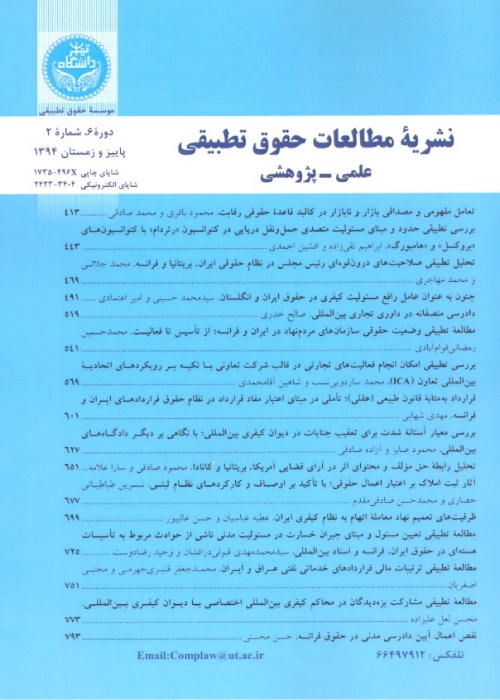The effect of the non-reliance clause on pre-contractual liability in English and American law
Author(s):
Article Type:
Research/Original Article (دارای رتبه معتبر)
Abstract:
The important business transactions are formed by preliminary negotiations. The need for extensive pre-contractual discussions comes from the fact that the two parties do not have sufficient knowledge about each other, the characteristics of goods, services, and transaction conditions, and they want to enter into a contract with good knowledge and will by negotiations. In the pre-contractual period, the two parties tell each other various things. Each party may commit significant errors in making these statements. The traded goods or services are falsely described in order to encourage the other party to conclude the contract, or the statements include mistakes, exaggerations, and inadvertent and even intentionally false statements. Some pre-contractual statements are relied upon by the audience, and with their inaccuracy, the integrity of wills is disturbed, and sometimes the validity of the contract is distorted or unstable. In this case, each party is allowed to submit documents indicating fraudulent claims and file a claim for rescission or claim for damages. On the other hand, the parties to commercial transactions are looking for certainty and confidence. During the conclusion of the contract, they try to limit or exclude potential responsibilities resulting from pre-contract period statements as far as possible, so that the possibility of termination and possibly claiming damages from the other party is eliminated. Therefore, sometimes they use the solution of "non-reliance" clause in the contract. According to this clause, none of the parties has trusted or relied on any statement made by the other party, but rather relies on his knowledge and belief.The mentioned clause in English law becomes binding by creating estoppel resulting from a statement or contract. Although invoking the non-reliance clause as a declaratory estoppel appears unassailable, contractual estoppel can be more successfully invoked by the plaintiff. Of course, the non-reliance clause does not work in the case of fraudulent misrepresentation, and no one can commit fraud against the law. In English law, the non-reliance clause must be fair and reasonable according to the Unfair Contract Terms Act, approved in 1977. Reasonableness is evaluated based on the specific circumstances of each case. The criteria for measuring the reasonableness of the non-reliance clause can be seen in the opinions of the courts.By examining the judicial procedure in America, it is observed that there are mixed opinions about the validity of the non-reliance clause and the possibility of its implementation. Courts can be divided into three groups based on the position that they have a non-reliance clause for determining the legal status: courts that refrain from implementing the non-reliance clause and base their judgment on moral prohibitions against lying or fraud. These courts assume that the parties derive no legitimate value from the non-reliance clause. The second group of courts recognize it by applying some restrictions, such as specific discussions of the parties regarding this clause. The third group are the courts that accept this clause without restrictions and taking into account the principle of contractual freedom and the sovereignty of the will of the parties.In this research, based on the descriptive-analytical method, non-reliance clause is introduced and the non-reliance clause is compared with the merger clause to clarify the differences between the two, despite their similarities. The most important reasons for including the non-reliance clause in contracts form the third part of the research, which includes prevention of lawsuits based on misrepresentation, prevention of suspension of contract execution, disclaimer of responsibility against representative's statements, facilitation of information exchange without any risk and impossibility. The contrary statement is true. The basis of the binding condition of reliance in the customary law system under the two headings of estoppel arising from statement and estoppel arising from contract are explained in the fourth section. In the fifth and sixth parts of the article, the validity of the condition of non-reliance in English and American law has been studied by referring to judicial practice and related regulations, and at the end, conclusions have been drawn from the above-mentioned materials.
Keywords:
Language:
Persian
Published:
Comparative Law Review, Volume:14 Issue: 1, 2023
Pages:
291 to 311
magiran.com/p2597292
دانلود و مطالعه متن این مقاله با یکی از روشهای زیر امکان پذیر است:
اشتراک شخصی
با عضویت و پرداخت آنلاین حق اشتراک یکساله به مبلغ 1,390,000ريال میتوانید 70 عنوان مطلب دانلود کنید!
اشتراک سازمانی
به کتابخانه دانشگاه یا محل کار خود پیشنهاد کنید تا اشتراک سازمانی این پایگاه را برای دسترسی نامحدود همه کاربران به متن مطالب تهیه نمایند!
توجه!
- حق عضویت دریافتی صرف حمایت از نشریات عضو و نگهداری، تکمیل و توسعه مگیران میشود.
- پرداخت حق اشتراک و دانلود مقالات اجازه بازنشر آن در سایر رسانههای چاپی و دیجیتال را به کاربر نمیدهد.
In order to view content subscription is required
Personal subscription
Subscribe magiran.com for 70 € euros via PayPal and download 70 articles during a year.
Organization subscription
Please contact us to subscribe your university or library for unlimited access!


